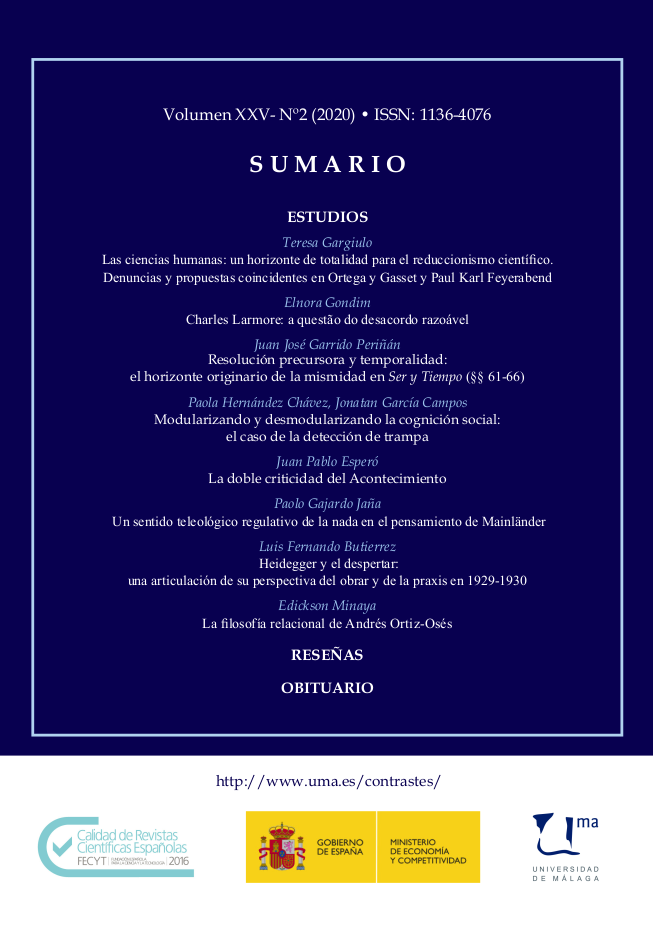A Teleological Regulatory Sense of Nothingness in Mainländer’s Thought
DOI:
https://doi.org/10.24310/Contrastescontrastes.v25i2.7580Keywords:
NOTHINGNESS, TELEOLOGY, MAINLÄNDER, GOD, WILLAbstract
In Mainländer’s philosophy, nothingness has a fundamental role. Nothingness has a teleological regulatory sense; that is to say, it is the end or goal of the universe, as a result of the first movement: the death of God. To understand how this author manages to expound that thesis, it is necessary to explore the previous steps that lead to such conclusion. Thus, some of the central aspects of this philosophy will be presented throughout this article, in order to understand the foundation of this proposal. Finally, the exceptional role that is attributed to the nothingness on this thought will be clarifiedDownloads
Metrics
Publication Facts
Reviewer profiles N/A
Author statements
Indexed in
-
—
- Academic society
- N/A
- Publisher
- Universidad de Málaga
References
Referencias bibliográficas
Baquedano Jer, Sandra. «¿Voluntad de vivir o voluntad de morir? el suicidio en Schopenhauer y Mainländer». Revista de Filosofía, 63 (2007) pp. 117-126.
___ «Estudio preliminar, el pesimismo entrópico en las cosmologías filosóficas de la voluntad», en P. Mainländer, Filosofía de la redención (antología). Santiago: Fondo de Cultura Económica, 2011, pp. 9-39.
Beiser, Frederick. «Mainländer's Philosophy of Redemption», en F. Beiser, Weltschmerz: Pessimism in German Philosophy, 1860 - 1900, New York: Oxford University Press, 2016, pp. 201-228.
Burgos Cruz, Oscar, & Godoy Patiño, Iliana. «Sobre una posible influencia de Mainländer en Freud», Tlamati, 6 (2015), pp. 6-18.
Caldeira Ramos, Flamarion. «O pessimismo e a questão social em Philipp Mainländer». Cuadernos de Filosofía Alemã, 10 (2007), pp. 35-50.
Dahlkvist, Tobias. «Nietzsche and the Philosophy of Pessimism». Tesis. Uppsala Universitet, 2007.
Espinoso Proa, Sergio. «Del deseo de no ser», en O. Burgos Cruz (coord.), Philipp Mainländer. Actualidad de su pensamiento, Guerrero: Universidad Autónoma de Guerrero, 2019, pp. 154-152.
Fonseca Analco, Marillen. «Cosmogonía melodramática: suicidio divino y destino en Mainländer y Borges», en O. Burgos Cruz (coord.), Philipp Mainländer. Actualidad de su pensamiento. Guerrero: Universidad Autónoma de Guerrero, 2019, pp. 117-130.
Fronteala Asensio, Pablo. «La libertad como identificación con la necesidad en Philipp Mainländer», en J. Chillón, P. Fronteala & Á. Martínez (eds.), Hombre y logos: Antropología y comunicación, Madrid: Fragua, 2019, pp. 295-303.
Gonzáles Serrano, Carlos. «Libertad fragmentada: voluntad de morir y muerte de Dios en Philipp Mainländer», en O. Burgos Cruz (coord.) Philipp Mainländer. Actualidad de su pensamiento, Guerrero: Universidad Autónoma de Guerrero, 2019, pp. 37-46.
Heidegger, Martin. ¿Qué es metafísica?; Ser, verdad y fundamento: Ensayos. Buenos Aires: Siglo Veinte, 1996.
Hernándes Días, Arnoldo. «Sobre el suicidio y el universo fracasado: nexos filosóficos en Philipp Mainländer y Emil Cioran», en O. Burgos Cruz (coord.), Philipp Mainländer. Actualidad de su pensamiento, Guerrero: Universidad Autónoma de Guerrero, 2019, pp. 131-143.
Hernández Moreno, Jesús. «Arthur Schopenhauer, Philipp Mainländer y la sensibilidad metafísica en el pensamiento contemporáneo», en O. Burgos Cruz (coord.), Philipp Mainländer. Actualidad de su pensamiento, Guerrero: Universidad Autónoma de Guerrero, 2019, pp. 91-115.
Kant, Immanuel. Crítica de la razón pura. Buenos Aires: Colihue, 2007.
Mainländer, Philipp. Diario de un poeta. Madrid: Plaza y Valdés, 2015.
___. Filosofía de la redención (Antología). Santiago: Fondo de Cultura Económica, 2011.
___. Filosofía de la redención. Madrid: Xorki, 2014.
Marcuse, Ludwing. Pesimismo un estado de madurez. Buenos Aires: Leviatán, 1956.
Nietzsche, Friedrich. «La gaya ciencia», en D. Sánchez Meca (ed.), Obras completas III, obras de madurez I. Madrid: Tecnos, 2014, pp. 704-905.
Sevilla Godínez, Héctor. «El suicidio de Dios. La apología del exterminio humano en Philipp Mainlander», en H. Sevilla Godínez (coord.) Analogías alternantes de la nada. Madrid: Plaza y Valdés, 2014, pp. 51-76.
Vega Delgado, José. La filosofía alemana, prolegómenos para una superación de la filosofía. Cuenca: Universidad de Cuenca, 1991.
Volpi, Franco. El nihilismo. Buenos Aires: Biblos, 2005.
Downloads
Published
How to Cite
Issue
Section
License
This journal provides immediate free access to its content under the principle of making research freely available to the public. All content published in Contrastes. Revista Internacional de Filosofía, are subject to the Creative Commons Attribution-NonCommercial-ShareAlike 4.0 license whose full text can be found at <http://creativecommons.org/licenses/by-nc-sa/4.0>
It is the responsibility of the authors to obtain the necessary permissions of the images that are subject to copyright.
Authors whose contributions are accepted for publication in this journal will retain the non-exclusive right to use their contributions for academic, research and educational purposes, including self-archiving or repository in open access repositories of any kind.
The electronic edition of this magazine is edited by the Editorial Service of the University of Malaga (Uma Editorial), being necessary to cite the origin in any partial or total reproduction.










5.png)
